
Saint John is a seaport city located on the Bay of Fundy in the province of New Brunswick, Canada. It is Canada's oldest incorporated city, established by royal charter on May 18, 1785, during the reign of George III. The port is Canada's third-largest by tonnage with a cargo base that includes dry and liquid bulk, break bulk, containers, and cruise. The city has a strong industrial base, including oil refining and manufacturing, matched with finance and tourism sectors and research institutions such as the New Brunswick Museum and the University of New Brunswick.
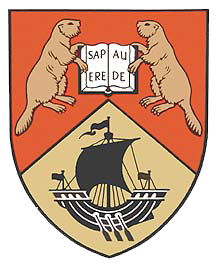
The University of New Brunswick (UNB) is a public university with two primary campuses in Fredericton and Saint John, New Brunswick. It is the oldest English-language university in Canada, and among the oldest public universities in North America. UNB was founded by a group of seven Loyalists who left the United States after the American Revolution.

Bathurst is a city in northern New Brunswick with a population of 12,157 and the 4th largest metropolitan area in New Brunswick as defined by Census Canada with a population of 31,387 as of 2021. The City of Bathurst overlooks Nepisiguit Bay, part of Chaleur Bay and is at the estuary of the Nepisiguit River.

The flag of New Brunswick consists of a golden lion passant on a red field in the upper third and a gold field defaced with a lymphad on top of blue and white wavy lines in the bottom two-thirds. Adopted in 1965 shortly after the new national flag was inaugurated, it has been the flag of the Canadian province since February 24 of that year. It is a banner of arms modelled after the province's coat of arms.
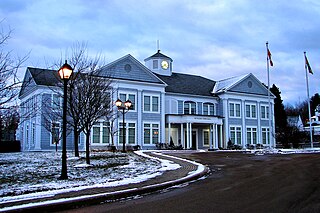
Rothesay is a suburban town located in Kings County, New Brunswick, Canada. Located within Saint John's metropolitan area, it borders the town of Quispamsis to form the Kennebecasis Valley and is located along the lower Kennebecasis River. As of 2021, the population of Rothesay was 11,977.

Hampton is a town in Kings County, New Brunswick, Canada.
Bernice MacNaughton High School, is a high school in Moncton, New Brunswick, Canada.

Riverside-Albert is a disincorporated village in Fundy Albert, New Brunswick, Canada. It resides in the geographic parish of Hopewell in Albert County.

The Hartland Covered Bridge or Hartland Bridge is the world's longest covered bridge at 1,282 feet (391 m) in length. Located in New Brunswick, Canada, the bridge crosses the Saint John River, joining the Carleton County communities of Hartland and Somerville. The framework consists of seven small Howe Truss bridges joined on six piers. The bridge was designated a National Historic Site of Canada in 1977, and a Provincial Heritage Place in New Brunswick under the Heritage Conservation Act in 1999.
Anglophone East School District is a Canadian school district in South-East New Brunswick. The district is an Anglophone district operating 38 public schools from grades Kindergarten to 12 in Albert and Westmorland counties. Notably, Havelock School is on the border of Kings County and Westmorland County.
The language policies of Canada's province and territories vary between the provinces and territories of Canada. Although the federal government operates as an officially bilingual institution, providing services in English and French, several provincial governments have also instituted or legislated their own language policies.
Watson Elkinah Reid (1858–1944) was a Canadian architect, a one time member of the California architectural firm, Reid & Reid.
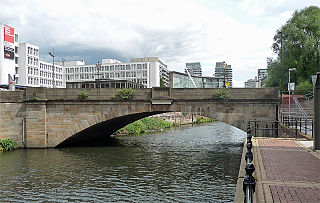
Albert Bridge is a Grade II listed skew arch bridge in Greater Manchester, England. A replacement for an earlier structure, New Bailey Bridge, it was completed in 1844. It crosses the River Irwell, connecting Salford to Manchester.

McAdam High School, previously known as McAdam Composite High School, is a grades 6–12 school located in McAdam, New Brunswick. The town and its high school are both named for late-19th-century politician John McAdam. It was founded in 1924, and renovated in1984. McAdam High is known for its cooperative education program.

Walter Woodworth White was a Canadian physician as well as a municipal and provincial politician in New Brunswick. He served as the Mayor of Saint John between 1902 and 1906, and again from 1926 until 1932. In provincial politics, White served in the Legislative Assembly of New Brunswick as a member of the Conservative Party, representing Saint John City from 1931 to 1935.
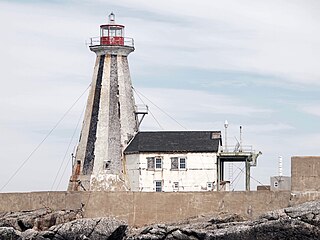
The Gannet Rock Lighthouse is a Canadian lighthouse located on a rocky islet 8 miles (13 km) south of Grand Manan in the Bay of Fundy. It was first lit in 1831 and was staffed until 1996. It was solarized in 2002 and remains operational in 2023. It was declared "surplus to requirements" by the Canadian Coast Guard in 2010 and is no longer being maintained.
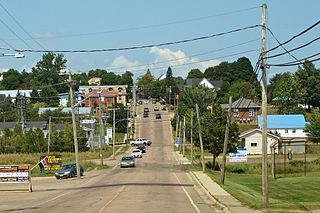
Fundy Albert is a village municipality in the Canadian province of New Brunswick. The jurisdiction was formed through the 2023 New Brunswick local governance reforms which saw the consolidation of local government entities into regions or districts.

The New Brunswick Teachers' Federation is a Canadian trade union and professional association representing 8,400 schoolteachers in New Brunswick. Teachers join the federation through one of its two constituent professional organizations: the New Brunswick Teachers' Association (NBTA), which represents anglophones, or the Association des enseignantes et des enseignants francophones du Nouveau-Brunswick (AEFNB), which represents francophones. The federation was founded in 1970, prior to which all teachers belonged to the NBTA.

Policy 713, also called the Sexual Orientation and Gender Identity policy, is an education policy of the province of New Brunswick, Canada, that sets minimum requirements for public schools and districts in the province related to individuals identifying and perceived as LGBTQIA2S+.

Barrack Green Armoury is a historic Canadian armoury in Saint John, New Brunswick. Built between 1911 and 1912, the armoury was recognized as a Federal Heritage Building in 1991. It is used by the 3rd Field Artillery Regiment, RCA, the 37 Signal Regiment, the 722 Communication Squadron and the Royal New Brunswick Regiment.


















